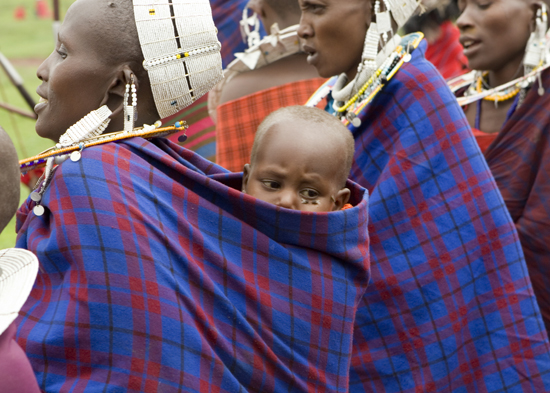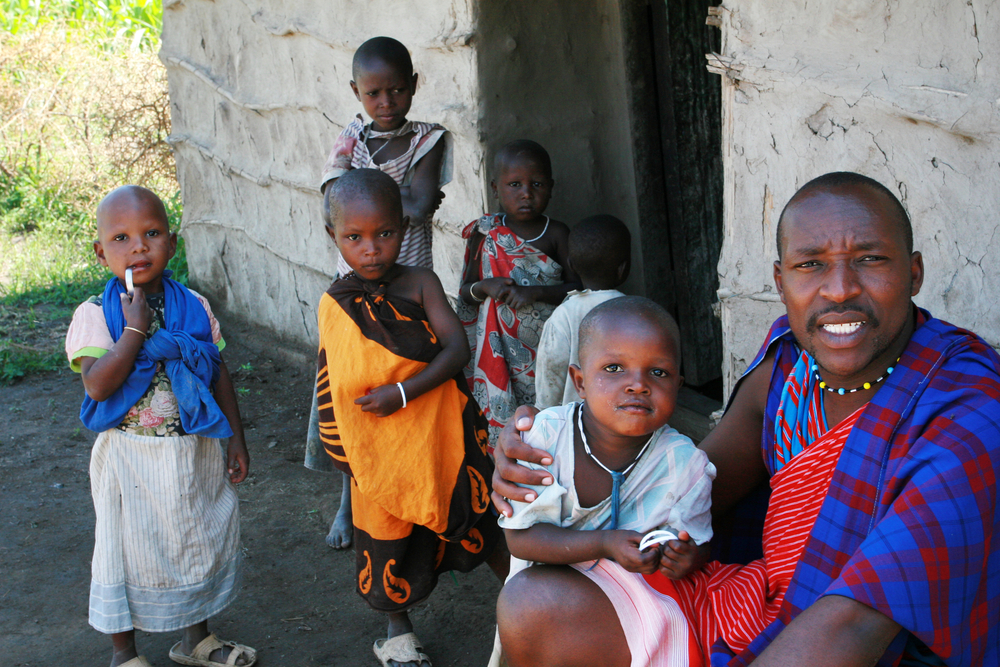Life in Tanzania includes a heavy dependence on traditional beliefs and practices (particularly in childbirth, initiation, marriage, and death), the prevalence of the extended family system, respect towards one’s elders, the importance given to marriage and childbirth, and a staunchly patriarchal society.
The saying “Pay attention to the pregnant woman, for there is no one more important than she” aptly reflects the importance of childbirth in the life of an average Tanzanian. Every birth is a joyous occasion, and parenthood elevates a person’s social and family status. Tanzanians believe that large families with many children reflect prosperity.
Ethnic Traditions
Among the Maasai, celebrations surrounding the birth of a woman’s first baby begin before the actual delivery. During the eighth month of pregnancy, the woman wears a sheepskin skirt while fat and blood are smeared all over her body as a symbol of purity. She drinks water from a gourd and always wears a special glass necklace made by one of the clan’s elderly women. Her husband slaughters a sheep and the pregnant woman, her female relatives, and their children eat the ribs on one side and the front leg.
After birth, a child usually spends its early years with its mother or other female relatives. They carry the babies by wrapping them in a rectangular piece of cloth known as the kanga tied close to the mother’s body. It is a common sight to see a baby fast asleep in a kanga while the mother works busily in the fields or trades vegetables at the market.
Although healthcare facilities are available in most parts of rural Tanzania, high costs deter many women from using them. As a result, more than half of all Tanzanian women give birth at home with the help of a traditional birth attendant or trained midwife. Hospital births are common among urban, educated women.
The naming ceremony, an elaborate social ritual, usually takes place about a year after the child’s birth. In accordance with traditional customs, Tanzanians keep the mother and baby in seclusion for the first year, and people place shrubs and trees around the house to seal it off. On the day of the ceremony, the mother selects an animal from the family’s herd for the men to slaughter.
After having their heads shaved, the mother and baby take a bath and don new clothes and beads. In the evening, the mother clears off the shrubs and trees surrounding her house. The return of the grazing cattle in the evening signals the start of the official naming ceremony.
During the ritual, a female elder, usually the grandmother, whispers the new name into the baby’s ear. The guests then bless the baby and shower it with various gifts. Parents usually add the name of their first child to their own names. For instance, the mother of a child named Mary or Zuber would become Mama Mary or Mama Zuber.
Christian communities generally baptize their children before their first birthday. Customarily, the local priest collectively baptizes all the neighborhood babies on a chosen day. Tanzanians also circumcise their boys sometime before they reach adulthood. In some communities, girls are also circumcised, typically between the ages of five and ten.
Urban, educated Tanzanians usually celebrate birthdays with family and friends, and it is common for the guests to give the celebrant various presents. Among rural communities, birthday celebrations rarely take place, since most families cannot afford it.
Reproductive Rights
Abortions are illegal in Tanzania and prohibited in every situation except when the life of the mother is at stake. However, facilities for illegal abortions are available in almost all areas and are widely used.
Copyright © 1993-2025 World Trade Press. All rights reserved.




